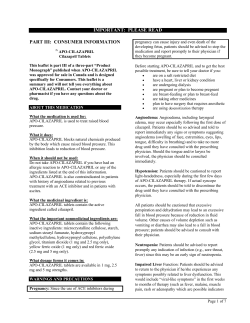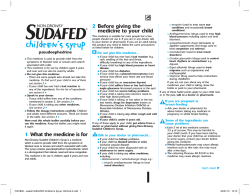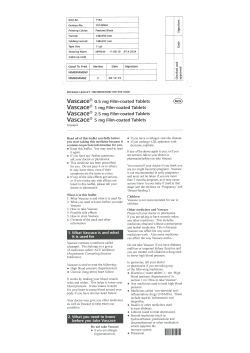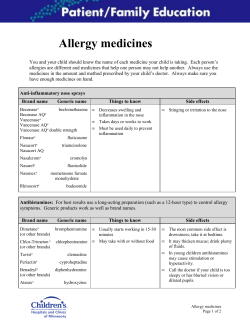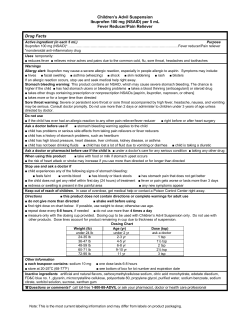
Angiotensin-converting enzyme (ACE) inhibitors
Angiotensin-converting enzyme (ACE) inhibitors Generic name benazepril captopril enalapril fosinopril Brand name Lotensin® Capoten® Vasotec® Monopril® How do these medicines work? Angiotensin-converting enzyme (ACE) inhibitors are used to treat many conditions such as hypertension (high blood pressure) and some heart conditions. They block a protein in the body that leads to tightened blood vessels. As a result, blood vessels are more relaxed, lowering blood pressure. How should I give it? Most of these medicines come in pill form and injection form. The pharmacist can make some of them into a liquid form. Give it at regular times to keep a steady level in the bloodstream. If your child is taking more than one dose daily, the last dose may be given at bedtime to avoid tiredness during the day. Use this medicine exactly as prescribed, even if your child feels fine. Your child should be awake and alert when taking any medicine. Follow the checked instructions: Generic name lisinopril moexipril quinapril ramipril Brand name Prinivil®, Zestril® Univasc® Accupril® Altace® If using the liquid form, shake well right before using. Draw up the correct amount in the medicine dropper or oral syringe. Give a small squirt of the medicine inside the cheek. To avoid choking, let your child swallow each squirt before giving more. For babies, you may want to mix the medicine with a small amount of formula or breast milk and give it with a bottle nipple before feeding. Do not add the medicine to a whole bottle because if your baby does not finish it, you will not know how much of the medicine was taken. For children who cannot swallow pills: • Crush it between 2 spoons or crush it inside a plastic bag or in folded paper. • Mix the powder with a very small amount (about 1 teaspoon) of soft food, such as applesauce, chocolate syrup, ice cream, jelly, or yogurt. Make sure your child takes all of the mixture. Other instructions: ______________________________ ______________________________ ______________________________ ACE inhibitors Page 1 of 3 Are there any precautions about food or other medicines? Use this medicine exactly as prescribed. Captopril (Capoten®) should be taken on an empty stomach (1 hour before or 2 hours after a meal). Other ACE inhibitors may be given with or without food. Do not give salt substitutes or potassium supplements, unless recommended by your doctor. Avoid alcohol-containing foods, beverages, or non-prescription medicines (such as cough syrup) while taking this medicine. Warning! Certain medicines interact with ACE inhibitors. It is very important to check with the doctor, nurse practitioner, or pharmacist before giving any other prescription or non-prescription medicines, herbs, or vitamins. What should I do if a dose is missed? If a dose is missed, and it is prescribed once daily, take the missed dose as soon as you remember that day. For medicines that are prescribed more often, follow these guidelines: If it is prescribed: twice daily 3 times daily 4 times daily Give it no closer than: 6 hours from the next dose 3 hours from the next dose skip the missed dose If it is too close to the next dose, skip the missed dose and continue with the regular schedule. Never give a double dose. If your child vomits (throws up) within 30 minutes after receiving a dose, give it again. If your child vomits the second dose within 30 minutes, do not repeat the dose again. If your child misses or vomits two doses, please call the clinic. What are the side effects? Common • • • • • Occasional • • • • • • low blood pressure drowsiness lightheadedness, dizziness tiredness, weakness increased potassium levels in the blood headache constipation confusion change in sense of taste cough skin rash The person taking this medicine should not drive, operate machinery, or do anything that could be dangerous (such as bicycling or riding a lawn mower) until it is clear that no risky side effects are present. The dose may need to be increased slowly, to avoid side effects. This medicine may make your child’s skin more sensitive to the sun. Use sunscreen and avoid sunlamps and tanning beds. If your child has other side effects that you think are due to this medicine, call your doctor or pharmacist. ACE inhibitors Page 2 of 3 When should I call the clinic? • • • • • • • • • • • • • • • slow, fast or irregular heartbeat, or chest pain that lasts longer than 15 minutes fainting or going unconscious (unaware of what is going on) swelling of the hands, feet, face, mouth, or throat wheezing, tightness of chest confusion weakness numbness or tingling in hands, feet, or lips dry mouth, increased thirst muscle cramps, nausea, or vomiting fever, muscle, or joint pain trouble urinating pain in side or lower back sudden stomach pain yellow skin or eyes allergic reaction; signs include: - fever or chills - rash or hives - wheezing - trouble breathing - call 911 Do not stop giving the medicine abruptly. Check with your doctor before stopping it. Always make sure you have enough medicine on hand. Each time you refill your prescription, check to see how many refills are left. If no refills are left, the pharmacy will need 2 or 3 days to contact the doctor to renew the prescription. Check the label and expiration date before giving each dose. Ask your pharmacist what to do with outdated or unused medicines. If there is no “take-back” program empty them into the trash. Store all medicines in their original container and away from direct sunlight or heat. Do not store in humid places such as the bathroom. Keep them out of children’s reach, locked up if possible. If too much or the wrong kind of medicine is taken, call the Poison Control Center toll-free at 1-800-222-1222. If your child is unconscious or has a seizure, call 911. What else do I need to know? Questions? Your doctor may ask your child to come to the clinic for examination to find out if the dose or the medicine needs to be changed. This sheet is not specific to your child but provides general information. If you have any questions, please call the clinic or pharmacy. You and your child should know the names of all the medicines he or she is taking. Share this information with anyone involved in your child’s care. Please remember to bring the medicine container when your child comes to the clinic or emergency department. Tell your doctor if your child has diabetes, heart disease, kidney disease, liver disease, or lupus. ACE inhibitors should not be taken during pregnancy. For more reading material about this and other health topics, please call or visit the Family Resource Center library, or visit our website: www.childrensmn.org/A-Z. Children’s Hospitals and Clinics of Minnesota Patient/Family Education 2525 Chicago Avenue South Minneapolis, MN 55404 Last Reviewed 5/2013 Copyright ACE inhibitors Page 3 of 3
© Copyright 2025
